THIS IS U OF T LAW



We acknowledge this land on which the University of Toronto operates. For thousands of years it has been the traditional land of the Huron-Wendat, the Seneca, and the Mississaugas of the Credit. Today, this meeting place is the home to many Indigenous people from across Turtle Island, and we are grateful to have the opportunity to work on this land.
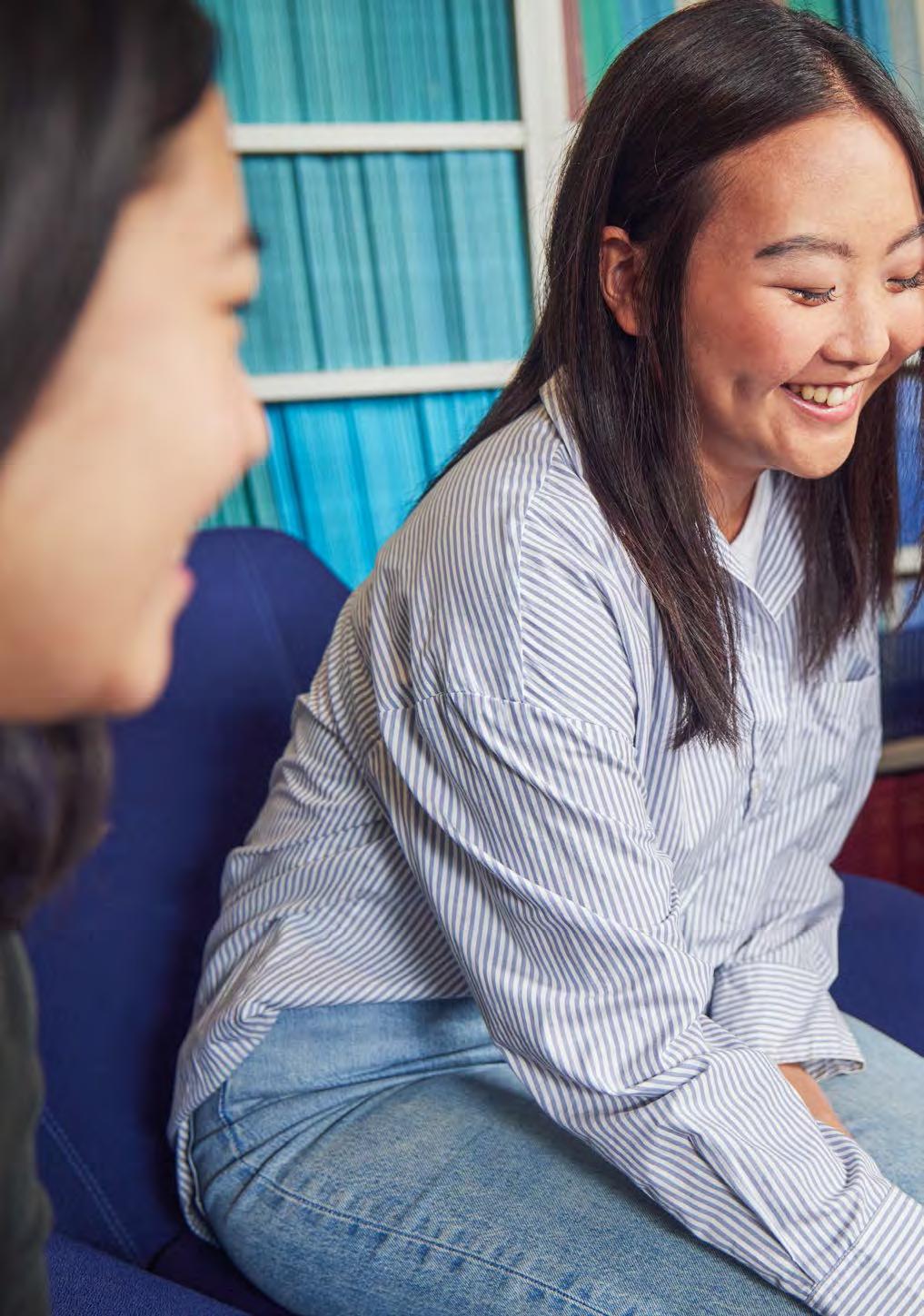


At the University of Toronto, we offer one of the world’s outstanding legal educations. To be a student at our law school is to join a wonderful community of the finest legal scholars and students, working together in the pursuit of academic and professional excellence.
You will learn from our remarkable faculty, who regularly win major research awards, and are thought leaders in academia, the legal profession and public policy. Studying at U of T Law will give you access to some of North America’s most established co-curricular opportunities that will acquaint you with the best of the legal profession both locally and internationally. You might work on criminal appeals pending before the Ontario Court of Appeal or Supreme Court of Canada, help provide advice to legal aid clients in immigration or refugee matters, volunteer for the UN while on an international human rights internship, or help give legal advice to tech start-ups at law firms and incubators across the city.
Our commitment to inclusive excellence and the public interest means that as a student, you will be part of a community with a wide range of knowledge, experiences and perspectives. A legal education at U of T not only teaches legal doctrine, but also equips students with analytical tools that give them an edge in tackling complex real-world problems. Our graduates go on to leadership positions in public interest organizations, politics, business, on the bench and bar, and much more with an education that serves them well in making a transformative impact on our community.
I am excited about the future of our law school. Its faculty and students provide intellectual leadership for and engagement with the rapidly changing world around us. Our Jackman Law Building, includes innovative technology and houses many of the programs and centres that make this faculty truly unique. Expanded classrooms and social spaces create dynamic engagement opportunities for students, professors and the community.
I hope that you’ll take up our invitation to visit with us as you carefully consider the many options available to you.
JUTTA BRUNNÉE DEAN, FACULTY OF LAW JAMES M. TORY PROFESSOR OF LAW
In 2023, the respected Times Higher Education law school rankings placed us in the top 16 globally, ahead of all other Canadian law schools.


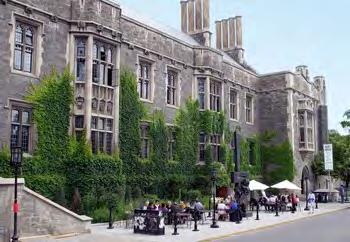
Reap the benefits of academic, cultural, social, athletic and recreational opportunities at one of the world’s foremost research-intensive universities. Immerse yourself in a rigorous learning environment that fostered 19 Supreme Court justices, four Canadian Prime Ministers, and ten Nobel Prize laureates. U of T continues to make the world a better place through leadership, inquiry, discovery and innovation.
Take advantage of the opportunities to engage with U of T’s other top-ranked graduate faculties and schools such as its Rotman School of Management, Temerty Faculty of Medicine, Factor-Inwentash Faculty of Social Work, Munk School of Global Affairs and Public Policy, etc. Explore the interdisciplinary dimensions of the law through workshops and conferences featuring top academics and experts from around the world.
At U of T Law, you are minutes away from the provincial legislature, Ministry of the Attorney General law offices, several court houses including the Ontario Court of Appeal, dozens of legal aid offices, and over 3,000 law firms, including Canada’s largest national and international firms.

Revel in the myriad of sights, sounds, and tastes to discover in one of the world's most multicultural cities. Here, you can attend many festivals, check out the vibrant arts, culture, entertainment and professional sports scenes and discover your inner foodie. With a population smaller than New York City but larger than Chicago, Toronto has it all.
The Faculty of Law is steps away from Museum Station where you can hop on the subway to get around this great city in just minutes. Toronto is known for its 140 distinctive neighbourhoods. Our students' local favourites – Yorkville, Kensington Market and Queen West – are all within easy walking distance of the campus.
Toronto’s amazing festivals include OVO and Unity (hip-hop); VELD and Dreams (EDM), Fringe and SummerWorks (theatre, art and dance); TIFF (film); Maker and Vector (technology and new media); Fan Expo and Comicon (comics, sci-fi, horror, anime and gaming).


BA (SIMON FRASER), JD (TORONTO), LLM (COLUMBIA)
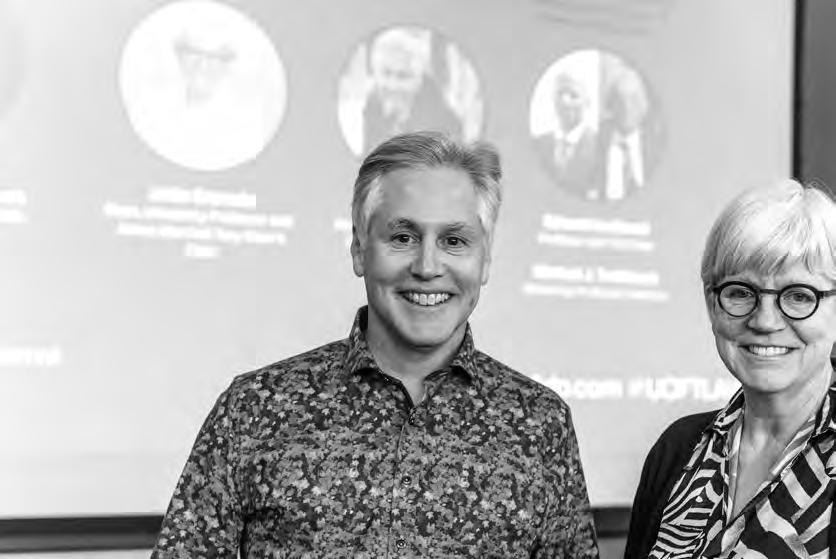

ACADEMIC INTERESTS: Aboriginal Law, Canadian Constitutional Law, Legal Theory, Political Philosophy and Theory, Property Law
ACADEMIC INTERESTS: Aboriginal Law, Constitutional Law


FAVOURITE NEIGHBOURHOOD:
HOBBY:

CAND. JUR. & LIC. JUR. (K.U. LEUVEN), LLM & DCL (McGILL)
ACADEMIC INTERESTS: Health Law and Bioethics, Biotechnology & Human Rights, Assisted Human Reproduction, Mental Health Law
FAVOURITE NEIGHBOURHOOD: Kensington Market to hang out, Cabbagetown to live
HIDDEN TALENT: Relatively fast cycling in the city (daily) and on country-roads, cooking
50+ FULL-TIME FACULTY 11:1 STUDENT TO FACULTY RATIO
In addition to our homegrown talent, we recruit our faculty from peer institutions at Harvard, Yale, Columbia, Oxford, Melbourne and other top global law schools.BA (BERKELEY), JD (UCLA), MA (TEXAS), Critical Legal Theory, International Human Rights Law, Juggles moderately well BA, MA, JD, LLM (TORONTO), PHD (YORK), LLD (DALHOUSIE, QUEEN'S, SIMON FRASER, YORK, LSO), DHL (TORONTO), FRSC, OC
BA (TORONTO), JD (COLUMBIA), MA (CHICAGO), PHD (CHICAGO)
ACADEMIC INTERESTS: Canadian Constitutional Law, Charter of Rights, Comparative Constitutional Law, Election Law, Judicial Decision-Making, Legal Theory, Political Philosophy and Theory
FAVOURITE NEIGHBOURHOOD: Annex
HOBBY: Growing orchids

BAH (QUEEN'S); JD, MA & PHD (STANFORD)
ACADEMIC INTERESTS: Artificial Intelligence Governance, Legal & Dispute Resolution, Contract Law, Legal Process & Theory, Economic Analysis of Law
FAVOURITE NEIGHBOURHOOD: Cabbagetown
HOBBIES: Cooking (especially East Indian cuisine), cocktails and canoe trips

BA (QUEEN’S), LLB (TORONTO), LLM (HARVARD), FELLOW OF THE ROYAL SOCIETY OF CANADA
ACADEMIC INTERESTS: Family Law, Legal Regulation of Sexuality, Law and Film
FAVOURITE NEIGHBOURHOOD: Wychwood Park
HIDDEN TALENT: Cooking like a Jewish grandmother

BA (TORONTO), JD (YALE), LLM (TORONTO)

ACADEMIC INTERESTS: Tort Law, Legal Procedure, Law & Technology
FAVOURITE NEIGHBOURHOOD: Downsview/ Black Creek
HOBBIES: Playing basketball with friends and soccer with my 3 year old child
BA (ATENEO DE MANILA), JD (ATENEO DE MANILA), LLM, SJD (HARVARD)
ACADEMIC INTERESTS: History of Human Rights, Law and Religion, Comparative Constitutional Law, Political Theory, Technology and the Law
FAVOURITE NEIGHBOURHOOD: Queen West
HOBBIES: Playing guitar, crashing drones, cooking
The Faculty of Law’s acclaimed faculty will inspire your learning throughout your degree. Our faculty members win major teaching and research awards, publish in prominent scholarly journals, address global policymakers and advise Canadian governments at all levels on the most pressing issues facing society today. From a range of backgrounds, law schools, countries and perspectives, our faculty provide you with insights into cutting-edge legal, social, economic and political issues to keep you at the top of your field.
We’re seeing changes in the landscape of the legal profession. Law firms like Stikeman Elliott are so excited to work together with the bright, entrepreneurial, hard-working, and forward-thinking U of T law students and graduates to help create a legal environment that celebrates the richness of different backgrounds. Knowing you are the leaders of tomorrow, I feel incredibly optimistic about our collective future.
RONA GHANBARI | HBSS (OTTAWA) 2014, JD (TORONTO) 2017 INTERIM DIRECTOR, STUDENT PROGRAMS, TORONTO STIKEMANRona is responsible for the recruitment, onboarding and integration of summer and articling students and leads the firm’s student program in Toronto. Prior to her current role, Rona was an associate practising in the Corporate Group in the Toronto office. Rona volunteers with various not-for-profit organizations, such as Matthew House Toronto’s Refugee Hearing Program, where she helps refugees prepare for hearings before the Immigration and Refugee Board of Canada. At U of T Law Rona was the Editor-in-Chief of Rights Review Magazine, the independent student-led publication of the faculty’s International Human Rights Program.


We provide top-notch support to help you define and launch your career, whether your aspirations are in government, academia, social justice, private practice, business or the arts.
Our Career Development Office (CDO) provides extensive career planning and professional development workshops, résumé and cover letter reviews, interview preparation and access to postings for summer, articling and post-graduation jobs.
TOP RECRUITERS FROM THE MAJOR LEGAL MARKETS COME ON CAMPUS TO HIRE OUR STUDENTS
2022-2023 CDO SUPPORTS
243 Articling job postings
303 Combined first and second year summer job postings
187 Career workshops, information sessions, events and firm tours facilitated
2027 Counselling appointments including individual consultations, mock interviews, résumé and cover letter reviews
Growing up as a Métis, my interest in Indigenous law was recatalyzed by the faculty and community at U of T which centered the intersection of the theoretical and pragmatic. This gave me the grounding to explore options beyond traditional law firms and work directly with Indigenous communities, supporting and advocating for what they understand reconciliation and self-governance to mean for their people.
WANEKIA DUNN | BA & MA (CARLETON) 2010 & 2013, JD & LLM (TORONTO) 2019 & 2020
MEMBER, INDIGENOUS LAW STUDENTS’
ASSOCIATION 2016-2020
U OF T TEAM MEMBER, KAWASKIMHON NATIONAL ABORIGINAL LAW MOOT
LEGAL INTERN, MÉTIS NATION OF CANADA 2018
LAW & POLICY LEAD, INDIGENOUS HOMELAND INITIATIVE, ECOTRUST CANADA

of T provided a gateway to New York City for me. The programs, professors and staff provided the foundation for me to practice capital markets law internationally. The relationships I’ve built with my professors and peers have been a source of support and guidance as I have navigated my career, and I am incredibly fortunate to have made so many life-long friends during my studies.
AMMA ANAMAN | BCOM (SASKATCHEWAN) 2008, JD/MBA (TORONTO) 2012
SUMMER ASSOCIATE & ASSOCIATE, SULLIVAN & CROMWELL LLP (NYC) 2011 & 2012-2015
ASSOCIATE, OSLER, HOSKIN & HARCOURT LLP (NYC) 2015-2017
MANAGING DIRECTOR & ASSOCIATE GENERAL COUNSEL, NASDAQ (NYC)
Amma Anaman is Associate General Counsel at Nasdaq in New York. She advises current and prospective Nasdaq-listed companies on Nasdaq’s listing rules and corporate governance standards, supports Nasdaq’s public policy initiatives, and is Corporate Secretary for the Nasdaq Foundation, whose mission is to advance diversity in investor engagement.

U
Get matched with an experienced lawyer who is practicing in an area of law that you are keen to learn about. Mentors provide invaluable guidance on how to navigate the profession and create contacts that will help your career development.
This popular podcast series features conversations with alumni about their cool jobs (both inside and outside the profession), and the important issues they are tackling. Previous speakers have been leaders in entertainment law, tech start ups, health law, cannabis law, sports law, military law, and international human rights.
Succeeding in the legal profession requires outstanding academic skills and the ability to effectively communicate ideas, work with diverse colleagues, and manage conflict—all in a highly complex and sophisticated work environment.
Our LSP provides opportunities for you to work with leadership experts to develop the skills you need to transition from awesome student to successful lawyer.
A partnership between U of T Law and the Rotman School of Management, Rotman@Law allows you to take online pre-MBA courses that cover the foundations of accounting, finance and statistics. You will build your business fluency, knowledge and skillset before you enter the profession.
At the start of your first year you'll be matched with an upper-year student mentor who will provide the “inside scoop” about making your first year a success, from academic support to co-curricular and social activities.
COMMUNICATING IDEAS
CONFLICT MANAGEMENT
EMOTIONAL INTELLIGENCE
NETWORKING AND BUSINESS DEVELOPMENT TEAM WORK
U of T Law alumni are some of the top lawyers and leaders in Canada and around the world. Our alumni network, more than 11,500 strong, is an incredible resource both during law school and after graduation.SAMPLE LSP WORKSHOPS
We are committed to providing a welcoming and inclusive environment for all of our students, faculty, and staff.

Vibrant and diverse affinity student groups sustain our sense of community and offer unique opportunities for connection at the law school.

For full details on our JD admission policies, requirements and application procedures, visit law.utoronto.ca/admissions
Our admissions process is designed to identify exceptional students who bring a broad set of life experiences to the study of law.
We consider all aspects of your application: academic, intellectual and personal.
The assessment is based two-thirds on the academic record and LSAT, and one-third on personal information. Our “whole person review” includes at least three readers, including faculty, staff and students. We have no quotas of any kind. We seek outstanding candidates from a wide variety of institutions, who come from across Canada and the world, of a variety of ages, with varied life experiences. This careful process allows us to assemble a vibrant and inclusive class where you will flourish.
General – the majority of applicants.
Indigenous – Indigenous people, including those of First Nations (status and non-status), Métis and Inuit heritage, whose representation in the legal profession we strive to increase.
Mature – those who will have at least five complete years of non-academic experience (outside of full-time study) by September 2022.
Regardless of admission category, Black candidates can opt to apply to this stream, which aims to increase Black law student representation at U of T Law.
BSAP applicants will have their personal profiles reviewed by members of the Black community, including our staff, students, faculty and alumni.
You must meet the same LSAT and academic requirements for admission that we seek from all candidates. BSAP does not have a designated quota for admission.
To be considered for BSAP, apply to a JD program by our standard deadlines and procedures, and also select the BSAP option in the School Submissions section of the application form.
By the end of May 2024, you will have successfully completed at least a three-year undergraduate degree at a recognized institution.
No particular courses are recommended. Almost all of our students have completed a four-year undergraduate university degree. Over the last decade, all of the admitted Mature applicants had some university education.
Last year’s entering class had a 3.90 out of 4.0 median GPA on their best three years of full-time undergraduate study.
For entry in August 2024, we accept scores from standard and Flex tests taken from June 2019 to January 2024 inclusive. Last year’s entering class had a median LSAT score of 167 (94th percentile).
This is your opportunity to introduce yourself to the selection committee, help it assess your likelihood of success at the Faculty of Law and predict what your contributions to the class will be. Try to demonstrate how your academics, experience (work and personal) and career goals make you an excellent fit for the program.
You may provide further personal information from a choice of topics we suggest, such as a meaningful intellectual experience, a vision of your future goals, obstacles to achievement, or how your identity, background and experiences will contribute to the diversity of the law school.
Black Student Application Process candidates must submit the standard admission materials plus an essay highlighting why they chose the BSAP stream.
Required for Mature applicants only.
INTERVIEWS, REFERENCES, GRE, GMAT, TOEFL, IELTS
These are neither required nor requested.
AUGUST 11-12, 2023
LSAT test dates
AUGUST 17, 2023
JD Applications open online for entry in 2024
SEPTEMBER 8-9, 2023
LSAT test dates
SEPTEMBER – OCTOBER 2023
U of T Law application information sessions law.utoronto.ca/admissionevents
SEPTEMBER ONWARD
U of T Law campus tours* law.utoronto.ca/campustour
OCTOBER 13-14, 2023
LSAT test dates
NOVEMBER 1, 2023
JD Year 1 application deadline
NOVEMBER 10-11, 2023
LSAT test dates
DECEMBER 2023 - MARCH 2024
JD Year 1 offers of admission made. Most offers are issued by mid-February.
JANUARY 12-13, 2024
LSAT test dates (last acceptable test for 2024 JD Year 1 admission)
FEBRUARY 23, 2024**
Welcome Day for students offered admission
APRIL 1, 2024
Deadline for acceptance of JD Year 1 offers of admission made by April 1
JUNE 1, 2024
UofT Law JD Financial Aid application deadline
AUGUST 19, 2024**
Start of JD Year 1 classes
* Subject to public health directives
** Tentative date
LSAT dates for Canada & USA are listed
www.ouac.on.ca/olsas
Obtain, submit and pay for the application online with the Ontario Law School Application Service (OLSAS), operated by the Ontario Universities’ Application Centre (OUAC).

Submit all required documents directly to OLSAS, as per the instructions on its website.
For JD combined degree programs, apply to each program separately according to its own admission requirements and application procedures.
Your file is considered complete when all required documents have been submitted to OLSAS, and are then forwarded to us by OLSAS for assessment. For first year applicants, the earliest that we usually review any files, whether complete or incomplete, will be within a week after the close of the November 1 application deadline.
As much as possible, we try to review completed files quickly. For first year applicants, we expect to make three main rounds of offers of admission. The first round occurs in early December, the second round in mid-February, and the final round in mid-March. Most offers are issued by mid-February.
SHOULD AI BE REGULATED?
86% YES
12% UNSURE
2% NO
TO SAVE A LOVED ONE'S LIFE, I WOULD
30% ZIP LINE
26% SKY DIVE
23% CN TOWER EDGE WALK
21% BUNGEE JUMP
BAN TIKTOK ON WORK DEVICES?
9% STRONGLY AGREE
28% AGREE
38% NEUTRAL
21% DISAGREE
4% STRONGLY DISAGREE
"YES"
VIP PASS
34% DRAKE
25% THE WEEKND
12% SHAWN MENDES
4% ALESSIA CARA
26% NONE OF THE ABOVE
PRIOR
21% CLASSICS/HISTORY/PHILOSOPHY/RELIGION
19% POLITICAL SCIENCE/INTERNATIONAL STUDIES
16% CRIMINOLOGY/GENDER STUDIES/ PSYCHOLOGY/SOCIAL SCIENCES
14% BUSINESS/ECONOMICS
11% ENGINEERING/MATH/SCIENCE
9% INTERDISCIPLINARY/OTHER
7% ENGLISH/LINGUISTICS/COMMUNICATIONS
3% VISUAL & PERFORMING ARTS
14
ANALYTICAL CHEMIST
ADVISOR, OFFICE OF THE PRIME MINISTER
FILM PROJECTIONIST
GLOBAL FRAUD AUTHENTICATOR
HARM REDUCTION COUNSELLOR
MARKETING DATA COORDINATOR
NEGIOTIATION ANALYST
SOCIAL MEDIA PRODUCER
STAND-UP COMEDIAN
THEATRE DIRECTOR & PLAYWRIGHT
BUSINESS/COMMERCIAL CONSTITUTIONAL CRIMINAL EMPLOYMENT & LABOUR
FAMILY
HEALTH
INTELLECTUAL PROPERTY & INNOVATION
INTERNATIONAL HUMAN RIGHTS
LITIGATION/DISPUTE SETTLEMENT
SOCIAL JUSTICE
Diego relishes the strong support network at U of T Law. From his first day in 2021 he continues to be an amiable leader who is cherished by fellow students for his contributions to the law school community.

Students' Law Society
Vice President, Finance
1L & 2L rep., Social & Finance Committee
Latin American Law Students' Association
reconstituted as the UofT Chapter of the Canadian Hispanic Bar Association Co-Founder & Co-President
The Hamish Stewart Cup Moot Team Member
International Human Rights' Program Researcher, Venezuela Accountability Project
U of T Hatchery
Intern, Go-to-Market Connector
Davis Polk & Wardell LLP (NYC) Summer Associate
A big part of law school is the community itself and I enjoy playing a role in fostering a supportive and vibrant student community. This motivated me to be active in governance to serve all my fellow law students and create a new club that connects Latin American students across different law schools in Canada. I’ve enjoyed the camaraderie and friendships that arose from teamwork while mooting in 1L, helping to seek justice for victims of atrocious crimes in foreign countries and providing legal expertise and market research for start up companies. The opportunities here are simply amazing.
DIEGO JIMENEZ JURI 3L | BAH (MCMASTER) 2021
What truly engages you? Culture, recreation, politics, media, performance, social issues, professional development or academic debates? Explore your passion and discover new interests by getting involved in the huge range of student clubs and activities that reflect the diversity and strength of our student body.
Our student clubs and student government host prominent speakers, put on plays, tackle social issues, and hold events that connect with the community.

Aboriginal Law Society
Artists‘ Legal Advice Services
Asia Law Society
Athletics Association
Black Law Students’ Association
Business Law Society
Canadian Assoc. of Refugee Lawyers
Canadian Hispanic Bar Association
Cannabis Law Club
Career Development Student Advisory Committee
China Law Project
Christian Legal Fellowship
Criminal Law Students’ Association
Disabled Law Students' Association
Emerging Practices Law Society

Environmental Law Club
Feminist Law Students’ Association
First Generation Network
Health and Wellness Student Advisory Committee

Health Law Club
In Vino Veritas - Wine Tasting Club
Indigenous Law Journal
Indigenous Law Students’ Association
Insurance Law Society
International Commission of Jurists
International Law Society
JD/MBA Students’ Association
Jewish Law Students’ Association

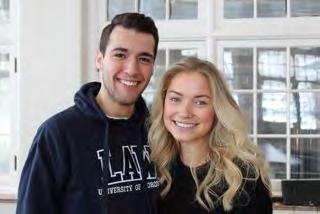
Journal of Law & Equality
Korean Law Students' Association
Labour & Employment Law Society
Law and Politics Club
Law Ball
Law Film Society
Law Follies
Law Games
Law Poets Society
Legal Hackers
Litigation Association
Muslim Law Students’ Association
Out in Law
Out of Province Students' Association
Peer Mentorship Program
Philosophy in Law Association
Planning & Development Law Assoc.
Polar Law Group
Privacy & Cybersecurity Law Group
Real Estate Law Society
Runnymede Society
South Asian Law Students’ Association
SPINLAW
Sports and Entertainment Law Society

Student Animal Legal Defense Fund

Students’ Law Society
Supreme Chords (a capella group)
Tax Law Society
Technology and Intellectual Property Group
Ultra Vires Student Newspaper
U of T Animal Justice
U of T Faculty of Law Review
U of T Faculty of Law Union
U of T Tabletop Gaming Club
Venture Capital Law Society
Women and the Law
Our first year (1L) program encourages you to develop close connections with your peers and professors. We will provide you with a deep and rigorous legal foundation rooted in diverse academic views about law and legal methodology.

We strive to create a sense of belonging to ensure that the law school community – and the profession – is inclusive. In our first year EDI series, students interact with legal scholars, practitioners and experts who provide critical perspectives on the link between equity and the practice of law.
The Office of the Assistant Dean, EDI oversees the implementation of the law school’s EDI strategies while our Equity, Diversity and Inclusion Committee also supports efforts to embed EDI principles in all law school activities and policies.


One of the central goals of our JD Program is to train you to “think like a lawyer.” The first year begins with a legal methods intensive course during the last two weeks in August, that introduces you to the foundational information and reasoning needed to make the most of the JD program.
The work product of lawyers consists of words that must be carefully selected based on deep understanding and research. Our experts will guide you through a series of carefully designed research and writing assignments to equip you to produce well-crafted legal text.
This pair of courses aims to address the range of considerations arising out of past and present interactions between Indigenous peoples and the Canadian legal system.
Every student takes one of the principal first year courses in a yearlong small group of 16 students. The remaining five principal courses are single-term, taught in larger groups, and comprise of Constitutional Law, Contract Law, Criminal Law, Property Law, and Tort Law.
Let’s be honest—law school is amazing but it also can be challenging at times.
Like other professional programs, law school is a rigorous academic and co-curricular program that demands a lot from students. That’s why we offer a broad range of student supports to make sure that you get the most out of your law school experience.



Through tutoring programs, peer and alumni mentoring programs, resilience coaching, and dedicated in-house mental health counselling, we support you to thrive in law school and your future career.

Building on the foundation of your 1L year, in the upper years you have the freedom to shape your studies to suit your interests and professional goals. Choose from over 180 courses that span the spectrum of legal practice and scholarship.
FOCUS ON ONE OR SEVERAL AREAS, INCLUDING:
Aboriginal Law
Academic Research and Writing
Administrative and Regulatory Law
Business Law
Civil Litigation and Dispute
Resolution
Constitutional Law
Criminal Law and Procedure
Environmental Law and Natural Resources
Family Law and Children
Health Law
Intellectual Property and Innovation Law
International, Comparative and Transnational Law
Judges and Courts
Labour Law
Law and Development
Legal Ethics and Professionalism
Legal Theory/ Interdisciplinary Legal Studies
Private Law
Social Justice and Equality
Taxation Law
Augment your JD studies with courses offered by other academic units at U of T. Complete a collaborative program or earn an additional certificate or a graduate degree.
Aboriginal Legal Studies
Environmental Studies
Sexual Diversity & Gender Studies
COLLABORATIVE PROGRAM
Jewish Studies
COMBINED DEGREE PROGRAMS
JD/Master of Business Administration
JD/Master of Global Affairs
JD/Master of Information
JD/Master of Public Policy
JD/Master of Social Work
JD/MA in Criminology
JD/MA in Economics
JD/MA in English
JD/MA in European & Russian Affairs
JD/PhD in Criminology
JD/PhD in Economics
JD/PhD in Philosophy
JD/PhD in Political Science
U of T Law attracts leading visiting academics from the world’s top law schools. Held in early January, the intersession offers intensive, week-long courses taught by visiting professors offering diverse perspectives on a huge range of legal topics.
I deliberated for two years before quitting my job as a tax manager to return to school. As a mother of two young children, I was afraid that I would not be able to commit fully to law school. However, after discussions with some of the most reputable professors in their field and surrounding myself with inspiring peers, I can say with confidence that I'll never regret my decision to attend U of T Law.

XUE GAO 3L | BCOM (TORONTO) 2015, CPA 2019
1L VOLUNTEER, FAMILY LAW, DOWNTOWN LEGAL SERVICES
1L SUMMER RESEARCH ASSISTANT, U OF T LAW
1L SUMMER STUDENT, TORYS LLP (TORONTO)
2L SUMMER STUDENT, OSLER, HOSKIN & HARCOURT LLP (TORONTO)
At U of T Law the range of experiential opportunities is impressive. You can take a course in trial advocacy, compete in an intellectual property moot, immerse yourself in an international human rights clinic, do an externship with the municipal government, or deliver pro bono services to communities facing barriers to justice.
Exclusive to our law students, U of T Law houses several legal clinics that offer academic credit in part-time, half-time and intensive, full-time formats. Students can also volunteer. Our clinics are led by full-time directors who are highly-regarded experts in their fields.
The Asper Centre focuses on advocacy, research and education about Canadian constitutional rights. Students work on leading constitutional and Charter rights cases at the highest courts in Canada and learn how to advocate for Charter-based law reform.
Established in 1987, our IHRP serves as a centre for international human rights work, through which experienced lawyers, faculty members, and law students engage in meaningful social change. The IHRP serves as a partner in international and domestic social movements, that encourage Canada's adherence to its international human rights commitments, while training the next generation of movement lawyers in Canada. Students acquire litigation and advocacy experience in areas such as
CONSTITUTIONAL RIGHTS
CRIMINAL LAW
EMPLOYMENT LAW
FAMILY LAW
HOUSING AND INCOME SECURITY
INTERNATIONAL HUMAN RIGHTS
INVESTOR PROTECTION RIGHTS
REFUGEE AND IMMIGRATION LAW
UNIVERSITY AFFAIRS
indigenous rights, social justice, climate justice, and corporate accountability.
DLS is the law school’s community legal clinic. Students assist clients who are experiencing legal problems in a number of high priority areas of law including criminal, employment, family, housing, refugee and immigration and university affairs. In their work at DLS, students critically examine the intersections of law and social inequality while developing the professionalism and ethical literacy that is essential to practicing law.
The lab explores the intersections between technology, entrepreneurship and innovation. Students discover how artificial intelligence and machine learning algorithms are changing the practice of law, discuss the many impacts of technology on society, and learn about design-thinking concepts as they formulate solutions to the most pressing issues affecting access to justice.
The IPC is committed to a diverse range of initiatives that empower and educate the community. Its work focuses on protecting vulnerable populations who are at risk of suffering harm and financial loss relating to their investments, including the elderly and newcomers to Canada. By participating in these ground-breaking projects, such as community education seminars and the development of policy recommendations, IPC students become active players in shaping the destiny of the financial sector while enriching the lives of those around them.
Making the connection between the classroom and real-life lawyering will prepare you for practice in whatever area you choose.
I’m here to learn, engage and make a difference. In my first year I’ve honed my writing skills from co-editing the Prisoner’s Right Handbook on inmates’ constitutional rights through the Asper clinic. It’s also been gratifying to support undergrad students with getting into law school as a BLSA reviewer of admission personal statements and as LSAT instructor and co-facilitator of the inaugural LSPP@UTSC. It’s meant a lot to see how sharing my own law school journey has inspired and encouraged them toward their own.
BRITTANY WILLIAMS 2L | BAH (MCMASTER) 2021
1L CO-EDITOR, ASPER CENTRE FOR CONSTITUTIONAL RIGHTS
MEMBER, BLACK LAW STUDENTS’ ASSOCIATION
ALUMNA, BLACK FUTURE LAWYERS

ALUMNA, LAW SCHOOL ACCESS PROGRAM, U OF T LAW
INSTRUCTOR & CO-FACILITATOR, LAW SCHOOL PREP PROGRAM, UTSC
In addition to our in-house clinics, you can participate in clinical placements for academic credit at community clinics and organizations. U of T Law offers placements with 21 externship partners.
Aboriginal Legal Services clinic
Advancing the Right to Housing externship
Advocates for Injured Workers clinic
Appellate Criminal Litigation externship
Barbra Schlifer Commemorative Clinic (services for women survivors of violence)
City of Toronto: Municipal Government Lawyering externship
Environmental Law externship
Health Justice Initiative clinic at St. Michael’s Hospital
Health Law, Innovation and Policy Lab at Mount Sinai Hospital
Innocence Canada externship (wrongful convictions)
Innovation and Entrepreneurship externship
John Howard Society of Ontario externship
Legislative Assembly Statutory Interpretation externship
Media Law - Investigative Journalism Bureau/Toronto Star externship
Mergers and Acquisitions Litigation externship
Not-for-Profit Board Governance externship
Ontario Human Rights Commission externship
Pro Bono Ontario litigation externship
South Etobicoke Community Legal Services externship
Structural Genomics Consortium externship
The Citizen Lab externship (global affairs/public policy)
Founded by U of T Law in 1996, PBSC is the largest pro bono organization in Canada with chapters in 22 law schools. PBSC’s volunteer students and supervising lawyers partner with community organizations to provide free legal support to people facing barriers to justice. This includes legal research, creating public legal education resources, and supporting clients and self-represented litigants through specialized clinics, in multiple areas of law. U of T Law students have the unique opportunity to participate in two of PBSC’s award winning initiatives, the Family Justice Centre and the Indigenous Human Rights Program.
Spend a semester at top law schools on academic exchange in some of the world’s best cities. AUCKLAND SYDNEY BEIJING HONG
U of T Law offers dozens of paid positions with public interest and community organizations. For example, students can spend the summer with the United Nations in Geneva, a grass-roots human rights organization in Kenya, an Indigenous Band Council in Northern Ontario, a Torontobased community advocacy organization, or a Chinese law firm in Shanghai.
In accordance with the Truth and Reconciliation Commission’s Calls to Action, Indigenous and non-Indigenous students engage with Indigenous Elders, scholars, activists and professionals in classes and activities at the faculty, in the courts and in the community.
You can compete in the Kawaskimhon Moot, work on the student-run Indigenous Law Journal, and have opportunities to learn about Indigenous and Aboriginal law inside and outside the classroom.
You can also gain practical experience by participating in our clinical program with Aboriginal Legal Services, and deepen your academic experience with the Certificate in Aboriginal Legal Studies.
Tawnshi! I’m a Métis Cree woman from Treaty 6 territory traditional lands in Alberta. At LAWS, I worked to research and recommend the mission, vision and design of a new Access to Law Program that will offer outreach, engagement and support to Indigenous students, spanning elementary school to the law school application process.
BRIANNA MORRISON 2L JD/MBA | BA (ALBERTA) 2021

1L REPRESENTATIVE, INDIGENOUS LAW STUDENTS’ ASSOC.
CO-EDITOR-IN-CHIEF, INDIGENOUS LAW JOURNAL
CO-HOST, INDIGENOUS HUMAN RIGHTS PODCAST, PBSC
1L SUMMER STUDENT, LAW IN ACTION WITHIN SCHOOLS
2L SUMMER STUDENT, ONTARIO MINISTRY OF CHILDREN, COMMUNITY & SOCIAL SERVICES
When assessing financial aid applications, the same budget is applied to all eligible domestic students from 2023-2024.
Ontario resident tuition: $33,040
Non-Ontario resident tuition: $35,730
Books and supplies: $1,100
Incidental and ancillary fees: $1,880
Room and board (if not at home): $16,700
Personal expenses: $2,550
Choosing to go to law school is a significant and rewarding investment in your life. If you are offered admission, tuition should not be a barrier to your education or your career. The Faculty of Law’s approach to financial aid is different than most law schools. With less than a handful of merit scholarships available, we apply an equitable and transparent approach to giving aid, where the students with the greatest financial need receive the most assistance.
The rumours are true: most law students in North America graduate with some debt. They also go on to fulfilling positions in a range of fields. Many of our students choose to dedicate themselves to legal aid clinics or specialty law firms that offer relatively lower-paying salaries. To support their career choices, we assist these students with the repayment of their eligible law school debt for up to ten years after graduation. Ours is the only program of its kind in Canada.
Flora came from a single parent home in Ontario with annual parental income of $63,121. She received a U of T Law bursary of $28,862 and a government student aid grant of $6,231. This non-repayable aid provided $35,093 towards her tuition and expenses.
We make it easy for you to know the amount of financial aid you may receive. Use our exclusive online tool for an aid package estimate tailored to your financial means at law.utoronto.ca/ financial-aid-estimator
Lark's parents earn an annual income of $191,554. As an Alberta resident, Lark received a U of T Law bursary of $10,854 and a government student aid grant of $6,000. The non-repayable aid contributed $16,854 toward tuition and expenses.
FIGURES LISTED ARE IN CANADIAN CURRENCY, ROUNDED TO THE NEAREST $100
Lark received aid covered 50% of academic fees.
Flora's aid covered 100% of academic fees.
2022-2023
$5.1 million AWARDED BURSARIES
$21,093 AVERAGE FIRST-YEAR BURSARY $39,004 MAXIMUM BURSARY AWARDED

287 # OF STUDENTS WHO APPLIED FOR FINANCIAL AID
82 OF FINANCIAL AID APPLICANTS WHO RECEIVED BURSARIES
Coming from a small town and being the first in my family to attend university, I thought my dream of attending U of T Law would be unachievable. This was prior to me learning about their incredible JD financial aid program.
For example, during my second year I received a bursary that covered over 60% of my tuition as well as interest-free loans to cover the remaining expenses. Thanks to the aid support, I was unimpeded financially, which enabled me to land my dream job. I could completely focus on my studies, extracurriculars and building a great network without worrying about debt and affording tuition.
We are proud to offer several programs and resources that aim to increase access to legal education.


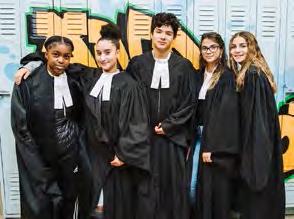

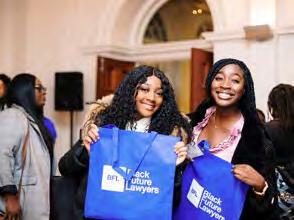




BECOMING A LAWYER IN ONTARIO law.utoronto.ca/getstarted
This resource is your starting point if you're thinking about becoming a lawyer. Prepared by U of T Law, it provides a comprehensive overview of the path from high school to becoming licensed to practice law.
LAWS: LAW IN ACTION WITHIN SCHOOLS lawinaction.ca
Founded by U of T Law in 2005, LAWS is Canada’s leading law school youth access program. As an award-winning model of collaboration that has transformative impact on high school students facing personal or systemic barriers, LAWS activities increase legal knowledge, encourage academic engagement and promote diversity and inclusion in the legal profession. LAWS works with over 1,200 youth and relies on the support of over 400 justice sector volunteers, including 100 law students, annually.
YOUTH SUMMER PROGRAM ysp.utoronto.ca
In partnership with the Temerty Faculty of Medicine, every summer the Faculty of Law offers a unique summer camp opportunity for high school students who are keen about the law. Students discuss advanced legal concepts, learn about the reality of the Canadian legal system, and apply their knowledge in a variety of experiential learning environments.
BLACK FUTURE LAWYERS
bfl.law.utoronto.ca
Black Future Lawyers (BFL) is a collaboration between U of T Law, our Black Law Students' Association, members of our Black alumni community, and the broader legal profession. Funded by U of T’s Provost's office, U of T Law, and leading national law firms, BFL offers supports and engagement opportunities to Black undergraduate students who aspire to go to law school and become lawyers. BFL’s goal is to increase the number of Black students who attend law school and join the legal profession.
law.utoronto.ca/iio
We welcome Indigenous candidates who are curious about a legal career to contact us for guidance and support from Indigenous members of our law school community.
LAW SCHOOL ACCESS PROGRAM (LSAP) law.utoronto.ca/lsap
For more than a decade, U of T Law offers a free summer LSAT preparation course enhanced with law school admissions support for high-potential current degree students or recent degree graduates from any university/college, who are any of: Black, Indigenous, from low-income families, or alumni of our LAWS youth access program.
LAW SCHOOL PREP PROGRAM (LSPP) @ UTSC
utsc.utoronto.ca/aacc/law-school-prep-program Modelled after, and in collaboration with, the U of T Law School Access Program (LSAP), the U of T Scarborough campus offers free summer LSAT preparation for its undergraduate students.
U OF T CUP UNDERGRADUATE MOOT COMPETITION
uoftmoot.ca
Established in 2016, U of T Law in partnership with the U of T Pre-Law Society undergraduate student club holds a weekend-long competition on a Supreme Court social justice case. This winter moot is open to undergraduate teams from universities across Canada and the USA.
Visiting us is the best way to experience our law school community. Book your student-led tour today at law.utoronto.ca/campustour
Can’t make it to the law school? Check out our admissions events page to see when we will be visiting a location near you at law.utoronto.ca/admissionevents.
PRODUCED BY THE JD ADMISSIONS OFFICE
DESIGN: KATINA CONSTANTINOU, SUGAR DESIGN
PHOTOS: JASON GORDON, MICHELLE YEE, JACKLYN ATLAS, JEROME POON-TING, ALEX WONG, SARA-MARNI HUBBARD, MUNA KHALIL, VIEL TOLENTINO, ALICE XUE, STUDENTS' LAW SOCIETY, KEITH CHIN PANG, DIEGO JIMENEZ JURI, JULIA DECKER, JAQUAN WILLIAMS, SHANNON LOUGH, STIKEMAN ELLIOTT LLP
T 416 978 3716 ADMISSIONS.LAW@UTORONTO.CA